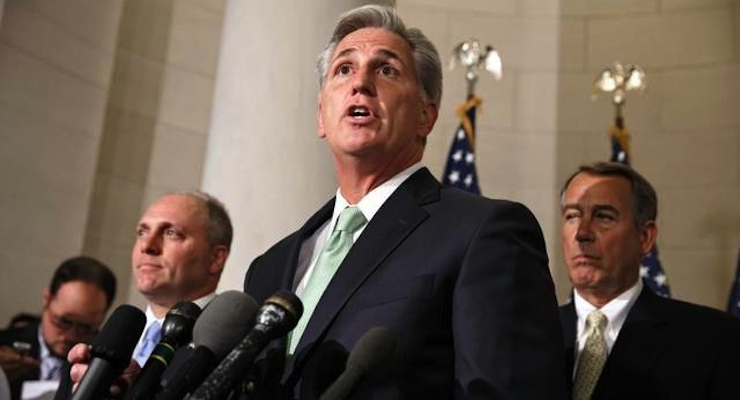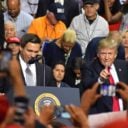

House Majority Whip Kevin McCarthy, R-Calif., is joined by Rep. Steve Scalise, R-La., and Speaker of the House John Boehner, R-Ohio, just after House Republicans voted to make McCarthy the new majority leader in 2014. (Photo: AP/J. Scott Applewhite)
Perhaps the least recognized and least appreciated triumph of the GOP Congress is the de facto spending freeze between 2009 and 2014. Fights over debt limits, sequestration,spending caps, and government shutdowns were messy and chaotic, but it’s hard to argue with the results. The burden of federal spending fell from 24.4 pct of GDP to 20.3 pct of economic output in just five years.
So I was pleased to see this morning that theWall Street Journal opined this morning on this success.
…amid all the conservative denunciations of the John Boehner era, a key political fact is typically ignored. To wit, the GOP takeover of the House in 2010 has led to a marked decline in federal spending.
…The stimulus boosted spending to a modern record of 24.4% of GDP in 2009… Then Republicans won the election in 2010 on a mandate to cut spending. …Total federal outlays fell two years in a row—from $3.6 trillion in 2011 to $3.45 trillion in 2013… The spending decline was even more marked as a share of the economy, falling for three straight years—from 23.4% in 2011 to 20.3% in 2014. This kind of spending restraint almost never happens in Washington…domestic spending fell by about 2.8% of GDP during the same period.
The editorial specifically praises the spending caps that were part of the Budget Control Act, which are enforced by sequestration.
…the discretionary spending caps and sequester included as part of the 2011 agreement…forced discipline that has kept a lid on spending-as-usual.
Amen.
The lobbyists, special interests, bureaucrats, cronyists, politicians, and contractors in Washington hate budget caps and sequestration, but it’s been a big success. Writing for the Washington Examiner, Michael Barone makes a similar argument.
The hold-down of federal spending was accomplished by the sequester procedure which has stayed in place now for four years. It’s not the optimal way to form a budget. But if your goal is holding down spending — and reducing spending from 25 percent of GDP to 20 percent — then the sequester has been very effective.
Now let’s consider some very good news.
The Budget Control Act, along with the genuine enforcement mechanism of sequestration, is the law of the land. The growth of discretionary spending is capped not only this year, but also next year. And the rest of the decade. And even into the 2020s.
But now let’s contemplate some very bad news.
The pro-spending crowd in Washington has been working hard to weaken the spending caps and they may be on the verge of success.
Here are some excerpts from a report in The Hill.
Congressional Republican leaders are launching budget talks with the White House. …News of the budget talks is already unnerving…
House conservatives… GOP leaders are seeking to strike a deal that would set top-line budget numbers for the next two years. …A White House official said McConnell and Boehner reached out to Obama on Sept. 17. …A source close to McConnell said he hopes to secure a deal to increase discretionary spending for defense and nondefense programs in exchange for reductions to mandatory spending.
Huh?!? Why are GOP leaders negotiating a new deal when there’s already a good deal in place for many more years?
In part, it’s because many Republicans are big spenders, particularly for the defense budget. ![]() But part of the answer is that President Obama has threatened to veto any budget that doesn’t bust the caps. The President has even threatened to shut down the government to get more spending. And GOPers think they’ll get blamed, even though Obama is the one who would be reneging on the deal he agreed to back in 2011.
But part of the answer is that President Obama has threatened to veto any budget that doesn’t bust the caps. The President has even threatened to shut down the government to get more spending. And GOPers think they’ll get blamed, even though Obama is the one who would be reneging on the deal he agreed to back in 2011.
So where does this lead?
Well, if Republicans don’t try (or don’t care) to make an argument for fiscal restraint, Obama will prevail. And the net effect will be a repeat of the so-called Ryan-Murray budget deal that weakened the spending caps back in 2013. That means more discretionary spending, accompanied by budget gimmicks and thinly disguised tax hikes. P.S. Some advocates of bigger government say sequestration would hurt the economy, but I challenge any of them to justify their Keynesian argument after looking at evidence from the U.S. and Canada in the 1990s.
P.P.S. And if sequestration is bad, then why didn’t any of the President’s hysterical predictions become reality after the 2013 sequester?





